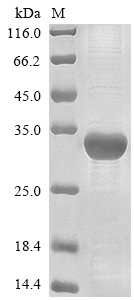Recombinant Pig Integrin beta-1 (ITGB1) is expressed in E. coli and comprises the amino acid residues 140-378. This partial protein comes engineered with an N-terminal 10xHis-tag and a C-terminal Myc-tag, which helps with purification and detection. The protein shows purity greater than 85% as assessed by SDS-PAGE, ensuring reliable performance in research applications. This product is intended for research use only.
Integrin beta-1 (ITGB1) appears to be a crucial component of the integrin family, playing what seems to be a significant role in cell adhesion and signal transduction. It's involved in various biological processes, including extracellular matrix interactions and cellular responses to the environment. ITGB1 is likely essential for understanding cell movement, proliferation, and survival. This makes it a valuable target for research in cellular biology and pathology.
Potential Applications
Note: The applications listed below are based on what we know about this protein's biological functions, published research, and experience from experts in the field. However, we haven't fully tested all of these applications ourselves yet. We'd recommend running some preliminary tests first to make sure they work for your specific research goals.
Pig ITGB1 is a transmembrane receptor that requires precise folding, proper disulfide bond formation, and specific tertiary structure for its functional activity in cell adhesion and signaling. The E. coli expression system cannot provide the eukaryotic folding environment, membrane integration, or post-translational modifications required for this complex protein. The partial fragment (140-378aa) lacks critical domains, including the transmembrane region and cytoplasmic tail, essential for full functionality. The dual N-terminal 10xHis-tag and C-terminal Myc-tag may cause significant steric interference with the protein's functional domains. The probability of correct folding with functional integrin activity is extremely low.
This E. coli-expressed ITGB1 fragment with dual tags is unsuitable for functional studies due to the essential requirements for membrane integration and proper folding that cannot be met in this expression system. The recombinant ITGB1 fragment can serve as an effective immunogen for antibody generation, as antibodies primarily recognize linear epitopes. The substantial fragment size (239aa) provides comprehensive epitope coverage. However, antibodies generated against misfolded protein may not optimally recognize conformation-dependent epitopes of native ITGB1 in biological systems. The dual tags enable epitope mapping but may also lead to tag-specific antibodies.
For reliable ITGB1 research, use a full-length protein expressed in mammalian systems that supports proper membrane integration, disulfide bond formation, and preserves native conformational epitopes.




